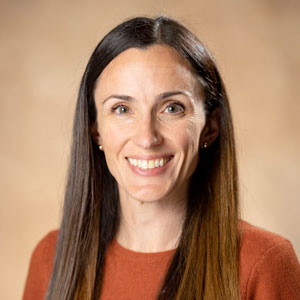Law enforcement and public safety leaders across the country know that people who have experienced or been exposed to human trafficking are among those imprisoned in their states. Yet, very little is known about just how many are imprisoned or how state correctional institutions are identifying these victims and what efforts are being made to connect them to trauma-informed services and support.
A joint study from researchers at UNC School of Social Work and partners at the N.C. Department of Public Safety (DPS) aims to shed some light on this issue. A manuscript from this larger study, “Human trafficking in correctional institutions: A survey of correctional and anti-trafficking leaders,” was recently published in the Journal of Human Trafficking.

“This research is one of the first to study how jails and prisons in the United States are responding to incarcerated human trafficking survivors in their populations,” said study lead investigator, co-author and professor Rebecca Macy. “Because most people in our jails and prisons will return to their families and communities, the study’s findings are important for guiding next steps for our research on trauma-informed practices and policies.”
For their study, lead author and associate professor Cynthia Fraga Rizo said the research team was particularly interested in better understanding what correctional institutions were currently doing related to human trafficking, including their perceptions around human trafficking and their roles in addressing it.
“We wanted to know how they were responding,” Rizo said. “Did they have screening tools and response protocols in place, and what did those look like?”
Perhaps most important, researchers wanted to know what, if any, training on human trafficking was being provided to correctional staff. The study surveyed corrections leaders and anti-trafficking advocates across the country and found that most or 89% agreed that individuals in their state’s correctional institutions have experienced human trafficking. However, respondents generally did not perceive that correctional staff are prepared to identify or respond to someone who has experienced human trafficking. Further, about 27% reported offering any training on how to recognize, support victims or prevent human trafficking in their correctional facilities.
“There is this discrepancy between leaders perceiving human trafficking is a problem in correctional institutions and the enactment of efforts to identify and respond to human trafficking in these settings,” said Rizo, whose study colleagues also included: Christopher J. Wretman, senior data analyst, The Cecil G. Sheps Center; Jia (Lisa) Luo, research project manager; Tonya Van Deinse, clinical associate professor; Nicole Sullivan, DPS adult correction and juvenile justice deputy secretary for analysis, programming and policy; Sarah Godoy, social work Ph.D. student; and Erin Meehan, evaluation associate, Prevent Child Abuse North Carolina.
Long-term, the goal would be to ensure that correctional staff are trained to identify individuals who have had an experience with human trafficking prior to entry or while they are incarcerated and those who may be at risk for human trafficking upon release, Rizo said. The next step – connecting identified victims to trauma-informed services and support to help prevent further experiences with human trafficking.
“To be at the forefront of treating trauma-based issues, we have to participate in more studies like this to drive the decision-making,” Sullivan said.
Because trafficking victims are often arrested for secondary crimes related to their victimization, such as drug possession and sex work, strengthening how these victims are identified once they are involved in the criminal justice system could potentially impact their incarceration, Rizo added.
“If a human trafficking situation led to their incarceration, can that be expunged?” she asked. “It just opens the door to more conversation and more research and more practice focused on making sure we are addressing human trafficking.”

